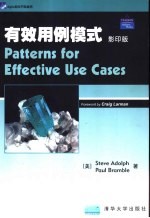
- 作 者:(美)阿道夫等著
- 出 版 社:北京:清华大学出版社
- 出版年份:2003
- ISBN:7302065578
- 标注页数:236 页
- PDF页数:260 页
请阅读订购服务说明与试读!
订购服务说明
1、本站所有的书默认都是PDF格式,该格式图书只能阅读和打印,不能再次编辑。
2、除分上下册或者多册的情况下,一般PDF页数一定要大于标注页数才建议下单购买。【本资源260 ≥236页】
图书下载及付费说明
1、所有的电子图书为PDF格式,支持电脑、手机、平板等各类电子设备阅读;可以任意拷贝文件到不同的阅读设备里进行阅读。
2、电子图书在提交订单后一般半小时内处理完成,最晚48小时内处理完成。(非工作日购买会延迟)
3、所有的电子图书都是原书直接扫描方式制作而成。
Chapter 1 What Is a Quality Use Case? 1
1.1 Why Use Cases at All? 1
1.2 What's So Hard about Telling Good Stories? 2
1.3 Why a Use Case Pattern Language? 5
1.4 What Are Patterns? 6
1.5 How Should I Use This Pattern Language? 9
1.6 What Is the Use Case Pattern Form? 10
Stepping through a Sample Pattern 11
1.7 Organization of the Pattern Language 19
Development Patterns 19
Structural Patterns 21
1.8 Supplement:A Brief Tutorial on Writing Use Cases 23
Chapter 2 The Team 29
2.1 Team Organizational Issues 30
2.2 Small Writing Team 31
Examples 33
2.3 Participating Audience 35
Examples 37
2.4 Balanced Team 39
Examples 41
2.5 Trade-offs and Collaborations 43
Chapter 3 The Process 45
3.1 Breadth Before Depth 48
Examples 51
Breadth Before Depth and UML,by Dan Rawsthorne 51
3.2 Spiral Development 52
Examples 54
Spiral Development and UML Models,by Dan Rawsthorne 57
3.3 Multiple Forms 58
Examples 60
3.4 Two Tier Review 64
Examples 66
3.5 Quitting Time 68
Examples 71
3.6 Writers License 73
Examples 75
3.7 Trade-offs and Collaborations 75
Chapter 4 The Use Case Set 77
4.1 Shared Clear Vision 80
Examples 82
4.2 Visible Boundary 86
Examples 88
Visible Boundary and UML Models,by Dan Rawsthorne 89
4.3 Clear Cast Of Characters 90
Examples 92
4.4 User Valued Transactions 95
Examples 98
4.5 Ever Unfolding Story 102
Examples 104
Ever Unfolding Story and UML Models,by Dan Rawsthorne 111
4.6 Trade-offs and Collaborations 113
Chapter 5 The Use Case 115
5.1 Complete Single Goal 118
Examples 121
5.2 Verb Phrase Name 122
Examples 123
5.3 Scenario Plus Fragments 125
Examples 128
5.4 Exhaustive Alternatives 129
Examples 131
5.5 Adornments 133
Examples 135
5.6 Precise And Readable 138
Examples 140
5.7 Trade-offs and Collaborations 142
Chapter 6 Scenarios and Steps 145
6.1 Detectable Conditions 148
Examples 150
6.2 Leveled Steps 153
Examples 154
6.3 Actor Intent Accomplished 158
Examples 159
6.4 Forward Progress 162
Examples 163
6.5 Technology Neutral 167
Examples 169
6.6 Trade-offs and Collaborations 171
Chapter 7 Use Case Relationships 173
7.1 Common Sub Behavior 176
Examples 178
Common Sub Behavior and UML,by Dan Rawsthorne 180
7.2 Interrupts As Extensions 182
Examples 184
Interrupts As Extensions and UML,by Dan Rawsthorne 186
Extensions and UML Extension Points 187
7.3 Promoted Alternative 190
Examples 191
Promoted Alternative and UML,by Dan Rawsthorne 195
7.4 Trade-offs and Collaborations 196
7.5 Captured Abstraction—A Pattern for Applying UML Generalization,by Dan Rawsthorne 198
Examples 199
Captured Abstraction and UML 200
Chapter 8 Editing Existing Use Cases 201
8.1 Redistribute The Wealth 204
Examples 206
8.2 Merge Droplets 209
Examples 211
8.3 Clean House 213
Examples 215
8.4 Trade-offs and Collaborations 215
References 217
Photo Credits 219
Index 223
